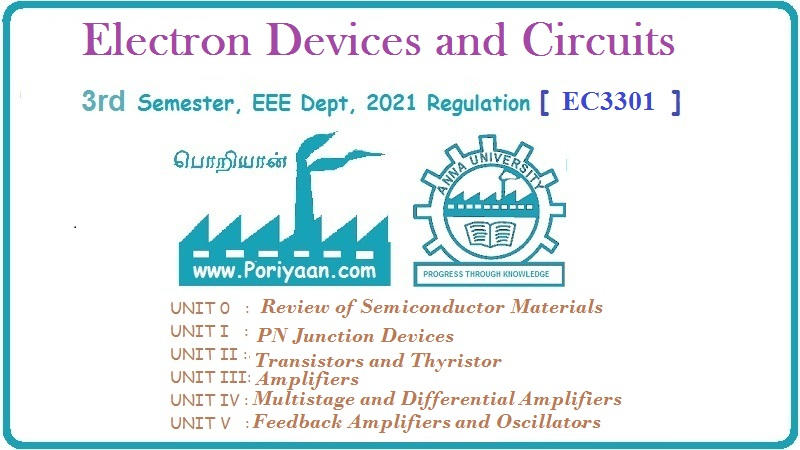Electron Devices and Circuits: Unit V: (b) Oscillators
Two Marks Questions with Answers
Oscillators | Electron Devices and Circuits
Electron Devices and Circuits: Unit V: (b) Oscillators : Two Marks Questions with Answers
Two Marks Questions with Answers
Q.1
Give the Barkhauseris criterion for oscillators.
AU
: Dec.-O3,09,11,12,13,14,16, May-04,11,14,16,17
Ans.
:
The Barkhausen criterion states that :
1.
The total phase shift around a loop, as the signal proceeds from input through
amplifier, feedback network back to input again, completing a loop, is
precisely 0° or 360°, or of course an integral multiple of 2π radians.
2.
The magnitude of the product of the open loop gain of the amplifier (A) and the
feedback factor p is unity i.e. | Aβ | = 1.
Q.2
Differentiate oscillator with amplifier.
AU
: May-10, Dec.-16
Ans.
:
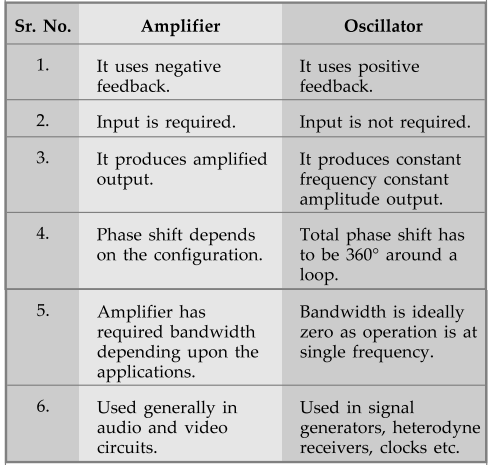
Q.3
What are the advantages of crystal oscillators ?
AU
: May-03, 05, Dec.-12
Ans.
:
The features of crystal oscillator are,
1.
It produces extremely stable outputs. Due to replacement of transistors or
elements like inductors and capacitors in conventional oscillators, the
frequency may get changed. In crystal oscillators such a change is not
possible.
2.
The temperature has no effect on the frequency.
3.
It has very much reduced phase noise.
4.
The crystal frequency depends on its physical dimensions hence proper frequency
rating can be achieved by cutting crystal to proper dimensions.
5.
Aging rates of crystals are 2 × 10-8 per year, for a quartz crystal.
This is negligibly small.
6.
In a quartz crystal, the frequency drift with time is, typically less than 1
part in 106 i.e. 0.0001 % per day. This is also very very small.
In
all, the frequency stability of crystal oscillators is very very good.
Q.4
What is the advantage of a Clapp oscillator over a Colpitts oscillator ?
Ans.
:
1.
The frequency is stale and accurate.
2.
The good frequency stability.
3.
No effect of stray capacitances.
4.
Frequency can be easily varied.
Q.5
Mention the expression for frequency of oscillations for Colpitt’s oscillator
and Hartley oscillator.
Ans.
:
For Hartley oscillator it is,

For
Colpitt’s oscillator it is,

Q.6
Mention any two high frequency LC oscillators.
AU
: Dec.-l0
Ans.
:1. Hartley oscillator 2. Colpitt’s
oscillator
Q.7
Define frequency stability of oscillator.
Ans.
:
The measure of the ability of an oscillator to maintain the desired frequency
as precisely as possible for as long time as possible is called frequency
stability of an oscillator.
Q.8
Why LC oscillators are not preferred to generate low frequency signals even though
they have higher frequency stability compared to RC phase shift oscillator ?
Ans.
:
At the low frequency, the value of L required in the circuit for generating low
frequency signals is very large as frequency is inversely proportional to the
value of L. The larger value of L makes the components large in size, bulky and
occupying lot of space. The overall cost of the circuit also increases. This is
practically not possible hence LC oscillators are not preferred to generate low
frequency signals.
Q.9
Give the classification of oscillators.
Ans.
:
The various ways in which oscillators are classified are shown in the Fig.
10.1.
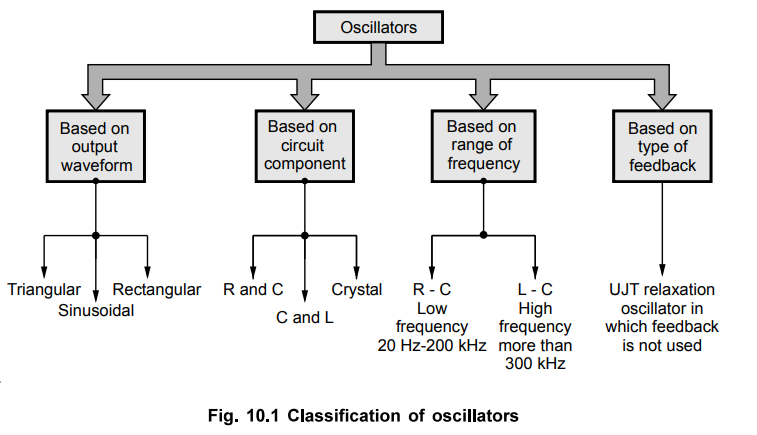
Q.10
State the frequency of RC phase shift oscillator.
Ans.
:
The frequency of RC phase shift oscillator is given by,

Q.
11 Define oscillator.
Ans.
: An oscillator is a circuit which basically acts as a generator,
generating the output signal which oscillates with constant amplitude and
constant desired frequency.
Q.12 How does the crystal oscillator maintains stable frequency ?
Ans
:
The frequency stability of the oscillator depends on the dθ / dω ie. rate of change
of phase with respect to frequency. Higher the value of dθ / dω better is the stability of the
oscillator. In crystal oscillator, the crystal oscillates at resonant frequency
at which is extremely high. Hence the frequency becomes independent of the
circuit features. Similarly effect of temperature on the crystal frequency is
negligibly small. Aging rates of crystals are about 2 × 10-8 per
year which are negligibly small. The frequency drift with time for the crystals
is also negligibly small. Hence the frequency oscillator maintains a stable
frequency.
Q.13
Why is it difficult to have a variable frequency operation with an RC
phase-shift oscillator ?
AU
: Dec.-05
Ans.
:
By changing the values of R and C, the frequency of the oscillator can be
changed. But the values of R and C of all three sections of RC phase shift
oscillator must be changed simultaneously to satisfy the oscillating
conditions. The exact changes in R and C values of all three sections is
practically impossible. Hence it is difficult to have a variable frequency
operation with an RC phase-shift oscillator.
Q.14
Define Piezo-electric effect.
Ans.
:
The piezoelectric effect means under the influence of the mechanical pressure,
the voltage gets generated across the opposite faces of the crystal. If the
mechanical force is applied in such a way to force the crystal to vibrate, the
a.c. voltage gets generated across it. Conversely, if the crystal is subjected
to a.c. voltage, it vibrates causing mechanical distortion in the crystal
shape. Every crystal has its own resonating frequency depending on its cut. So
under the influence of the mechanical vibrations, the crystal generates an
electrical signal of very constant frequency. This is called piezoelectric
effect.
Q.15
Give the equivalent circuit of quartz crystal and mention its series and
parallel resonance frequency.
Ans.
:
For the equivalent circuit, refer section 10.13.2. The series resonant
condition occurs when the reactances of series RLC leg are equal i.e. XL = XC.
The series resonance frequency is given by,
fs
= 1 / 2π√LC
In
series resonance, the mounting capacitor does not play any role.
The
other resonant condition occurs when the reactances of series resonant leg
equals the reactance of the mounting capacitor CM. This is parallel
resonance or antiresonance condition. Under parallel resonance, the equivalent capacitance
is Ceq = CMC / CM + C Hence the parallel resonating
frequency is given by,
Q.16
What is the principle behind operation of a crystal oscillator ?
AU
: Dec.-07
Ans.
: At
the series resonant frequency, the crystal appears resistive in the circuit,
impedance is at a minimum and current flow is maximum. As the frequency is
increased beyond the point of series resonance, the crystal appears inductive
in the circuit. Thus operating the crystal at a frequency slightly higher than
series resonant frequency it operates as an inductor and replacing inductor by
such a crystal in oscillator tank circuit, a stable frequency as decided by the
crystal can be achieved.
Q.17
A Wien bridge oscillator is used for operation at 10 kHz. If the value of the
resistance R is 100 kohms, what is the value of C required ?
AU
: Dec.-08
Ans.
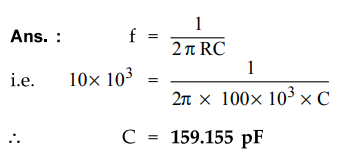
Q.18
Why a LC tank circuit does not produce sustained oscillations. How can this be
overcome ?
AU
: Dec.-08
Ans.
:
There are certain losses in the LC tank circuit. Due to these losses the
amplitude of the oscillations goes on decreasing and finally oscillations stop.
Hence LC tank circuit does not produce sustained oscillations. The overall gain
of the circuit must be increased so as to overcome the losses of the circuit
and then circuit will start oscillations.
Q.19
State the frequency ranges of RC and LC oscillators.
Ans.
:
The RC oscillators are used for low frequency range i.e. from 20 Hz to 200 kHz.
This is audio frequency range hence these oscillators are called A.F.
oscillators. The LC oscillators are used for high frequency range which is more
than 200 kHz upto few gigahertz (GHz).
Q.20
If L1 = 1 mH, L2 = 1 mH and C = 0.1 nF, what is the
frequency of oscillation of the Hartley oscillator ?
Ans.
: For
Hartley oscillator,
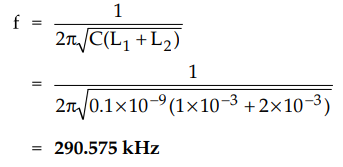
Q.
21 If C1 and C2 are 200 pF and 50 pF respectively.
Calculate the value of inductance for producing oscillations at 1 MHz in the
Colpitt's oscillator circuit.
Ans.
:
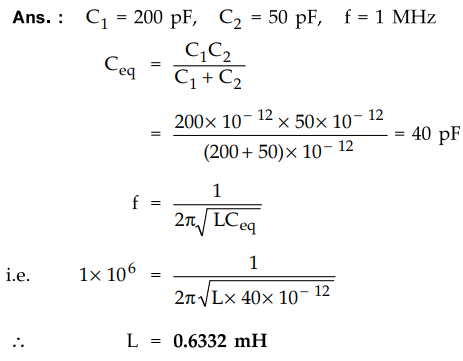
Q.
22 In an RC phase shift oscillator, if its frequency of oscillation is 955 Hz
and R1 =
R2 =R3
=680 kΩ. Find the value of capacitors.
AU
: Dec.- 10
Ans.
:
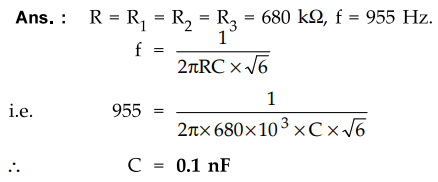
Q.23
A Wein bridge oscillator is used for operations at 9 kHz. If the value of the
resistance R is 100 ki, what is the value of C required ?
AU
: May-11
Ans.
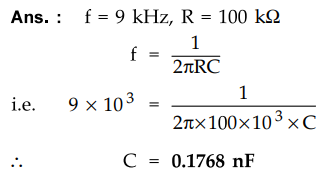
Q.24
Write the merits and demerits of RC phase shift oscillators.
(Refer
sections 10.5.6, 10.5.7)
AU
: May-12
Q.25
What is the expression for the frequency of oscillations of a wein-bridge
oscillator ?
AU
: May-15
Ans.
:
For Wien bridge oscillator,
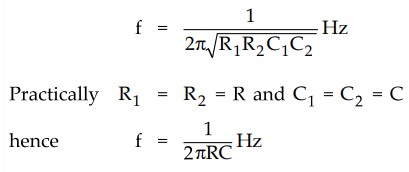
Q.26
What is the advantage of a Colpitis oscillator compared to a phase shift
oscillator ?
AU
: Dec.-15
Ans.
:
The advantages of Colpitt's oscillator are,
1.
Pure output waveform
2.
Good stability at high frequency
3.
Wide range of frequency, from 1 to 60 MHz.
4.
Simple construction hence simple to design
5.
Improved performance at high frequency.
Q.27
What are the essential blocks of a transistor oscillator ?
AU
: Dec.-17
Ans.
:
The two main blocks of transistor oscillator are transistor amplifier and
feedback network.
Q.28
In a phase shift oscillator, R1 =R2 = R3 = 1 MΩ
and C1 = C2 = C3 = 68 pF. At what frequency
does the circuit oscillate ?
Ans,
:

Electron Devices and Circuits: Unit V: (b) Oscillators : Tag: : Oscillators | Electron Devices and Circuits - Two Marks Questions with Answers
Related Topics
Related Subjects
Electron Devices and Circuits
EC3301 3rd Semester EEE Dept | 2021 Regulation | 3rd Semester EEE Dept 2021 Regulation
